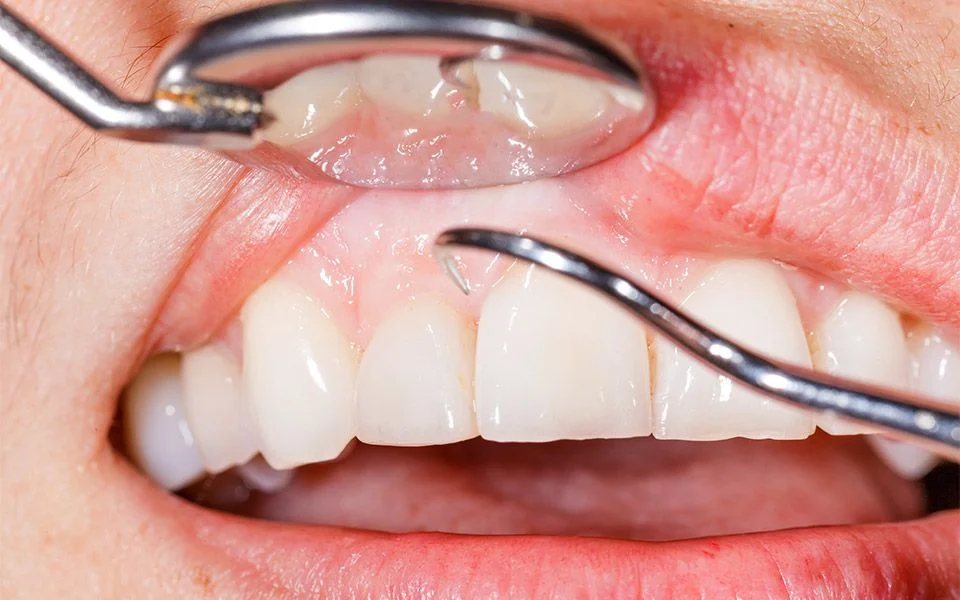Periodontitis Treatment in Jackson MS Periodontitis Relief and Restoration at Mosal Dental
Gums provide support and protection not only to your teeth but to the tissues that connect them to the bone. When your gums have problems and become diseased then you run the risk of losing your teeth. Not only can that cause problems with your appearance but it will cause more serious health problems.
Periodontal disease, more commonly known as gum disease, is a bacterial infection of the gums and tissues that support the teeth. It is caused by the build-up of plaque and tartar, usually from poor dental hygiene, and is the leading cause of adult tooth loss.
Research shows that 47.2 percent of American adults over the age of 30 have mild, moderate or severe gum disease, Most do not even know that they have gum disease because of the absence of visible symptoms.

There are two major stages of periodontal disease: gingivitis and periodontitis. Gingivitis is a mild form of gum disease. The common signs include bad breath and sore and bleeding gums, especially when you brush and floss. Gingivitis is reversible if properly treated.
When gingivitis is left untreated, it can progress into periodontitis, a more destructive stage wherein bacteria penetrate the deeper areas of the bone and periodontal membrane. The infection then spreads and creates small pockets of space between your teeth and your gums. Eventually, the pockets will become infected due to the build-up of bacteria, leading to bone and tissue loss, loose teeth, and even tooth loss.
Who Needs Gum Disease Treatment?
There are several reasons how gum disease can start, but the most common cause for it are areas that are left uncleaned. If there are certain areas and spots that are not covered when you’re brushing your teeth, then there is a high likelihood that bacteria and other microorganisms could start building up there.
Certain types of people are more prone to developing gum disease:
- Users of tobacco products
- Pregnant women
- People with a family history of gum disease
- Diabetic
- Stressed
- Those who grind or clench their teeth
Symptoms of Gum Diseases
There are numerous symptoms that could indicate gum disease. Here are some of the more common symptoms that you have to be on the lookout for:
- Redness of the gums
- Bleeding when brushing
- Gum line that is receding
- Loose teeth
- Bad breath
- Sores in the mouth
One problem with gum disease is that pain is not necessarily a symptom. A person suffering from it might not even feel any discomfort. This means that you really have to keep a sharp eye on the other symptoms that we have listed.
Why Do We Need To Treat Gum Disease?
Recent studies have shown the connection between periodontal disease and stroke and heart disease. Research has found that periodontal infection may strongly contribute to the development of heart disease and pose a serious threat to people with diabetes and respiratory diseases. It may also increase the risk of premature and underweight births.
If the prevalent sentiment in the old days was that the worst that might happen is tooth loss, all that has now changed. Periodontal disease is characterized as a bacterial infection of the gums. Bacteria may then travel into the bloodstream and go directly to the heart. Treating gum disease is now as crucial as ever.
Treatment for Gum Disease
A regular visit to our clinic could help protect you from gum disease. First of all we can check if you are actually suffering from gum problems. Once we determine the kind of disease that is affecting your gums then we can provide you with the right treatment for it. Here are some of the services that we can provide:
- Periodontal disease treatment bone graft
- Laser gum disease treatment
- Treatment for loose teeth
- Stage 3 gum disease treatment
- Stage gum disease treatment
We would be cleaning the affected area and make sure that we get down to the pocket of the tooth because that is where most gum infections occur. We might also take X-Rays and other tests to ensure that we have the right diagnosis for your condition.
In severe cases of gum disease, we might have to resort to surgical treatments in order to take care of the problem. Surgical treatments would include bone grafts, tissue grafts, and guided tissue regeneration.
Non-Surgical Treatment
The most recognized type of non-surgical treatment is scaling and root planing. This procedure involves the careful removal of plaque and tartar from the tooth roots and then smoothening any rough spots so that bacteria and irritants will be prevented from accumulating again. This procedure is usually done in conjunction with either topical or oral antibiotic medications to eliminate infection-causing bacteria.
Surgical Treatment
The most common surgical treatments include flap or pocket reduction surgery, soft tissue grafts, bone grafts, guided tissue regeneration, and applying tissue-stimulating proteins. The primary approach is to be able to not only replace damaged gum tissue and bone but encourage bone regrowth, as well.
You can be sure that we use the latest equipment with all of our treatment procedures. Our dental team would also keep you informed about all of the options that you have concerning your gum disease treatment so you will be the one making the choices. Call us now for more information.
More of our Dental services
Frequently Asked Questions
Get In Touch
Why Mosal Dental?
Since 1974, Mosal Dental has offered friendly, cost-effective dentistry to the local area. Our patient-focused team strives to create a fun, positive experience for even the most apprehensive client. Our goal is to provide personal, tailored dental treatment for each patient.
